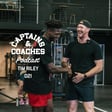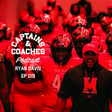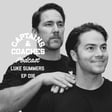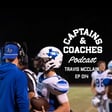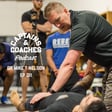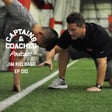Introduction to the Podcast and Guest
00:00:00
Speaker
Welcome to the Captains and Coaches Podcast. I am your host, Tex McQuilken, and today I am joined by my good buddy, Zach Zillner, the Director of Performance for University of Texas Women's Basketball and co-host of the Coach Them Up Podcast.
Balancing Fun and Pressure in Collegiate Sports
00:00:15
Speaker
Today we get into a conversation about balancing fun and tension and pressure that athletes face at the collegiate level.
00:00:23
Speaker
Learn how Zach manipulates the weight room and prepares his athletes for the conflict and challenges that are presented by their head coach at practice that eventually leads them to Big 12 championships, the Elite Eight, and a lot of awesome things for the NCAA basketball. Fun
Zach Zillner's Personal Journey and Mentorship
00:00:42
Speaker
conversation. I'm very excited to share Zach's journey with you and we explore the awesomeness that he's experiencing with his team on train heroic Z train, his podcast, and of course, his journey coaching amazing athletes and connections with mentors like coach Andrea Hootie.
00:01:00
Speaker
This episode is brought to you by the Old Bull program, also on Train Heroic. This is a Flexibull program focused on efficient and effective strength training for the busy professional. I also have an awesome way where I integrate leadership, self-leadership developed lessons into the training programs to help you build a foundation of life outside of the weight room. Check it out, seven day free trial link in the show notes.
Role and Experience with Texas Women's Basketball
00:01:28
Speaker
Without further ado,
00:01:29
Speaker
Let's hand it off to Coach Zillner. Ready? Ready? Break.
00:01:43
Speaker
Let's clap. That's a good clap. You're a good editor. All right. Captains and Coaches podcast action. Welcome to the show. In studio, Coach Zach Zillner the head sports performance coach for Texas Women's Basketball, co-host of the Coach M. Up podcast, and then Z-Train online training through Train Heroic.
00:02:05
Speaker
Welcome. Thanks for having me. This is great. Long time pal. Long time pal mostly. I know. I'm glad. Yeah. 2017. Yeah. Glad you were able to make the drive out to drip and then be a part of the show. Thanks for having me.
Cultural Challenges and Team Dynamics
00:02:20
Speaker
We do have a fun conversation to have and we helped prep you for the show because you've been through multiple head coaches.
00:02:29
Speaker
You've been through multiple colleges, so have an array of experienced teams working with different cultures, creating your own culture, navigating the the aspect of recruiting, transfer portals. There's a lot to learn that we can hand off to our listeners, man, so I'm excited.
Year-Round Training and Team Cohesion
00:02:49
Speaker
it. All right. I want to start with team building. So ah basketball is a winter sport, but then the girls are reporting to you year round? Yeah, we trained 48 out of 52 weeks last year. So I think out of any sport on campus, basketball is there the most. I think we train the most frequent out of any other team, football, volleyball, baseball, whatever, like basketball is on campus all the time.
00:03:13
Speaker
Yeah, which unbeknownst, right, the the world only sees the sport when it's in season. November to April, hopefully. Yeah. And on on ESPN, so they only know that, but then there's this whole world of performance and training and preparation.
00:03:29
Speaker
that that's the world we live in. but yeah So I love to dive into this stuff. And now you're currently in the fall preparing for the the kickoff and season October. October, I think our first game practice will start right at the end of September. And then we have 42 practices till our first game. Wow, that's a lot more than I anticipated. Yeah, and we got that's when the 20 hour rule starts. So you got 20 hours of activity per week.
00:03:54
Speaker
That's a lot. Yes.
Leadership and Goal Setting Strategies
00:03:56
Speaker
And so in this moment, you get the opportunity, the new new students, new girls are on campus and it's handed off to you and trusted to you to start to build and mold this team and bring them together.
00:04:08
Speaker
So let's speak to how you're using conditioning, not only to measure progress, their VO2 max and all the de formalities where you need to mark register and and maintain, but then there's this other EQ, this emotional quotient where you're aiming to to build the bonds that are going to be stressed throughout the whole length of the season through March to the championship. Championship, right there. Yeah. So speak to that that initial assessment where most people want to only measure their, maybe their output, if you will. How do you use the the output measurements and conditioning to then start to test where your team and your girls are at at this moment? Yeah, so it starts kind of back in June. We have everybody report back to campus, new freshmen transfers, whatever, everybody's there. um We sit down and kind of have our team goal for the season. And so we break it down to this year, our team goal as a national championship.
00:05:08
Speaker
And my big thing, I think a lot of teams set goals that aren't realistic or, you know, if you won two games last year in conference, it's probably not good to break down to national champions on three. That's probably not realistic. So my thing is like, this is realistic goal for us.
00:05:25
Speaker
if we're willing to do the steps that it takes to get to that point. And so everything we do, every standard that we have set should come back to the national championship. And what that entails is a high level of detail, effort, intent every day. So no bad days.
Preseason Conditioning and Mental Toughness
00:05:40
Speaker
um The intent and effort need to be aligned with that goal we said we wanted to achieve. um I use the summer basically to set the standard and the tone of what it needs to look like when we really start things in August.
00:05:54
Speaker
So we'll go through the summer, we kind of put people in different positions to lead, um show basically what they have to give to our team and what role they want to have. um I think a lot of people get it twisted with who's a leader and who's not. I think they forget about how much of importance influence is. So you have a lot of athletes that have high level of influence on the team, but poor leadership skills.
00:06:23
Speaker
And so I tell them the summer and the preseason is kind of a time to earn your voice. And what I mean by that is nobody likes the athlete that doesn't come in extra, you know, half-asses some stuff, doesn't put full effort, and then they're the ones telling you to hustle more, we need to try harder, let's go guys. Like if you haven't earned your voice, then you need to work on being in charge of yourself and getting the task done at hand. And so we kind of have to sit down and figure out who has influence and who has actual leadership qualities on the team. So I don't care if you're the best player or worst player, if you've earned the right to have a voice and you get to have a voice. um August starts our preseason conditioning.
00:07:08
Speaker
So they're at 6 a.m.s, three times a week. So it's bright and early. um You don't don't necessarily want to be there. um But if the bigger goal at hand is to you know win a national championship or all these accolades you want, like let's do a little sacrifice when it's not convenient. um It's kind of old school in the fact, and I like it for this aspect of we could condition at 2 p.m.
00:07:31
Speaker
when we've already had breakfast, lunch lunch, and we're feeling good, do the same conditioning thing, we'd probably get a similar result physically, but I think the mental aspect of preparing the night before, matching in the clothes we're supposed to wear, getting up to get your breakfast in, hydration, and prepared to work during a time where you know you could be sleeping in.
00:07:52
Speaker
So you're choosing to make a difference, get better, and chase those goals that you want.
High Standards and Athlete Accountability
00:07:58
Speaker
And so, like with anything with conditioning, like it's athletes would rather probably practice or shoot than you know run various activities that I have them do. um But I think it puts them in positions to expose them in a good way or a bad way. I think it's really easy to talk the talk when you're comfortable, you're not out of breath, all that kind of stuff. but i think you really start to see people's personalities, their strengths, and is certainly their weaknesses when they get a little fatigued. And so we try to create and instill some adversity every day where they might fail or a few athletes might fail, and then how are we going to respond to that? Is it going to turn into a blame game, negativity talk, or is it more of, you know, we got this, let's do this together, how can I help you?
00:08:43
Speaker
achieve the task at hand. And I think the only way you can really do that is through you know physical exertion. Yeah, intelligently designed, obviously. True. so Yeah, that's that's a big thing when applying the conditioning. Yes, all the the aspects biologically ah important so you don't injure people or lead down the road to certain injuries poorly conditioning, but at the same time, it's such an opportunity to really turn and shape individuals into leaders. Absolutely. And ah you mentioned clothes, so like little assessments in line with everybody's wearing the same uniform. So you got to have same shoes, same socks, same shorts, same shirt. And it's our arts are up to our captains or our leaders on the team, usually the upperclassmen.
00:09:32
Speaker
of making sure everybody is in that. And we have different protocols if someone shows up in a wrong shirt, wrong shoes, whatever. It's either you know extra conditioning or what we've done is you forgot your right shirt, you better hustle back to your dorm room and find it until then your teammates are going to be working while you're finding your shirt. And I think that attention to detail and caring about, you know, you need to do your laundry so your shirt's ready to go. You need to do it the night before, so that preparation the night before, which can also lead
Building Resilience Through Conditioning
00:10:02
Speaker
into other things. So I set out my outfit.
00:10:05
Speaker
my granola bar, my water, I'm ready to compete and go. And so what I've seen is our upperclassmen and our leaders on the team the night before will send out these detailed PDFs of like, here are the orange shorts we need to wear with this certain logo, it needs to have this logo here, not the other orange ones that are the logos here. And so everything should be mapped out the night before with high detail, just like you're preparing for a game, like you're going over a scouting report, this happens to be your uniform report, I guess. And now shaping that behavior, did you install that package? Was this ah something that a teammate brought? Was another coach handed this down? but So as our positions are like athletic performance coaches, you are an extension of the coaching staff. So whatever my coach thinks is of the utmost importance, that's going to be my thought as well. So if we all know that the whatever socks you have on,
00:11:02
Speaker
doesn't matter as far as the conditioning piece, like you're probably gonna get similar results with white socks and orange socks or black socks. You gotta work on your salesmanship. I agree. But the truth of the matter, it's that attention to detail that really brings it out that you need to have some preparedness before going into a situation. So if head coach thinks white socks on Tuesdays are the way to go, then you better believe you better have white socks on a Tuesday.
00:11:29
Speaker
um So I think it's everybody speaking the same language. You can never have one coach, especially the head coach, not hard on them and you are hard on them. Or if the head coach has a high standard, you can't let little things go. Because ultimately our job is to prepare prepare them for practice physically, but mentally. like If coach cares about little details, you better care about little details just as much.
00:11:51
Speaker
And now, in in line with that, the the captains are in charge of executing that. We'll call it the the game plan for just the clothes for right now. So now, how do the captains handle speaking to teammates who made the mistake or, you know, a self-destructive behavior, whether they realize that or not, and they just brought the wrong orange shorts? Yeah, I think the biggest thing is teaching these athletes, like, language and tone.
00:12:19
Speaker
and then the athlete receiving it to look for the message, not necessarily not necessarily the language or tone. right And so in the midst of competition, you might be a little more assertive or loud or you know not quite as eloquent with how you present things, but just know the reason why they're frustrated with you in this moment is because they're trying to win. They're trying to be perfect that day. So you messed up, not a big deal.
00:12:46
Speaker
in the grand scheme of things, but let's, you know, put into place that what's not going to happen again.
Coaching Strategies and Adaptation
00:12:52
Speaker
If you're the reason why we're running extra, you better win those sprints. Like you can't have you in the back doing that kind of stuff. And then you as a leader, you have to understand like people make mistakes.
00:13:02
Speaker
Let's hope it's a one and done situation, but you need to be, hey, I know you screwed up. Let's not have this snowball. And so everybody has a bad session because what you'll see a lot of times is we start out with having to do extra running punishment because you forgot the wrong shoes and the whole session is trashed. And so it's like, how can you respond? You guys had a bad first quarter in our game. Are you going to let that affect the next three or you're going to hold up guys? Enough is enough. Let's get back on track. Yeah.
00:13:29
Speaker
So then in your career, how long did it take you to realize and have awareness for those lessons of, hey, this this is not going according to my practice, my training plan.
00:13:40
Speaker
but this is a a learning moment for the team. Yeah, I think it's being a young strength coach, I think, especially if you had like a good situation in an internship, you kind of think everything is like where you started. So I kind of had this false narrative of when I was at Kansas, every basketball program around the nation operates like this. And then when I got my first job, it was totally different. And so you need to be able to adapt to the situation, whether that's, my biggest thing is like lifting before practice. And then in my first job, ah the women's coach wanted to go after practice. And I was so frustrated with, this is how it should be done. You should listen to me. I've worked with really good teams, yada, yada, yada. Keep in mind I was 22.
00:14:25
Speaker
do it all but She'd been coaching twice as long as I'd been alive. And it was one of those of like, okay, let's figure out why she wanted this. And her reasoning wasn't even she understood performance wise would be better before practice. But with her team, she thought it would instill some toughness in them that they would have to do this hard lift after a long practice. And I was like, okay,
00:14:51
Speaker
performance wise, probably not the best choice, but you want to use it as a mental type situation. So I sat down, we talked, I said, just so you know, performance wise, she's like, I don't care, mentally, we're gonna do this. So it was up to me to be intelligent. And the fact of if we're gonna train after practice, probably can't be the the same stuff we would do before. And so kind of do that, do what they wanted, and eventually got to the point of, okay, let's go before practice, all that kind of stuff. So I think you can't be so hard-headed in everything you do.
Athlete Engagement and Focus
00:15:22
Speaker
And I think that's tough for young people. I'm 34 now, and it's taken me probably this long to realize, you know, yeah the bigger picture of things.
00:15:32
Speaker
And you willing to concede that opinion that you held eventually got allowed you the opportunity to gain trust and then eventually convince the correct, let's live before versus like combating coaches, doesn't know what they're talking about. And then you never allow that opportunity. Then it's teamwork. Like in the day, like, we preached our athletes, you know, teamwork, you're in for sacrifice, servant leadership, all this stuff. And it's like, okay,
00:15:58
Speaker
I need to look in the mirror, and maybe I need to sacrifice my methodology, what I think is correct, for the bigger picture of everything. So it's like if I could butt heads all year, and then I bet at the end of the season, I'd be have ah have to get my resume dialed up for something else. So it's that pick and choose of what are you willing to really stand up for, and what things in the grand scheme of things aren't that big of an issue. Yeah, golden rule. If you're the coach you want coaching you,
00:16:27
Speaker
be the student, the teammate, that you want to lead. It's a hard thing. It's easy to say, but then when you have to put it into action, it's like, all right, different story here. Yeah. Then back to team conditioning. Again, you are in line not only applying the pressure, the stress, intelligently tracking it, you're also there to shape the behaviors in the moment. That's when the best time to get ahead of negative behaviors. I'm applying this stress in June, July, August, September. So that way when I hand them off to sport coach, they're not acting this way because it negatively affects their at their playing time. So what are some tools to assess behavior? and We already put the the clothes in line. Now during the stress, what are you looking for that then you can then shape?
00:17:19
Speaker
I think the biggest thing is like laying out what we're going to do for the day that right before we start the session. So I'll let them know like it's a sprint session. If you work hard for me, that means max effort, max intent between these sprints. I will give you rest.
00:17:33
Speaker
If we aren't doing it to the standard that I think I'm going to have to cut down the rest periods because we're not going to work on speed and power today um because you're not willing to go hard enough, then we need to work on work capacity. And work capacity is never fun. So I can shorten up those rest intervals for you. And then I think setting the tone of like positivity like this is fun.
00:17:54
Speaker
and I need it to be loud and energetic. So I think a lot of athletes look at conditioning as like, what's happening to me instead of what's happening for me. And so you can tell the session when you start, everyone everyone's like, it's six a.m., what's that God plan for us? Oh my God. And it's like, why would you come in with that approach? How about you come in with like, do whatever he's got on the sheet, like we're gonna crush it and he's gonna be blown away that he couldn't break us today.
00:18:18
Speaker
But a lot of these athletes, they come in and it's like, I already have you broken right before you came in, because you're so scared of what's going on. But like trust in your preparation. like We trained for eight to 10 weeks over the summer to get you to this point. like You told me you were working hard during the summer. I saw it. like Trust in that preparation. preparation You earned that confidence. like Go out there and get it. So now assessing focus in the moment. So two two parts to this question. the first Focusing on the the intent that as you've laid it out if you're not hitting the max speed power here
00:18:55
Speaker
OK, you're showing me that we can go lower intensity, but also assessing their ability to to to focus on the task at hand. Because college, there's a lot of stress going on outside of practice. Absolutely. So speak to us about your ability to assess the the focus on the true intent as you've laid it out and help protect them from the outside world that may infect their performance.
Promoting Athletic Development and Life Skills
00:19:19
Speaker
So we'll do little stuff where I want them engaged. So like when I call out, like it starts with the warm up.
00:19:25
Speaker
butt kicks. Everyone needs to repeat it. So they're locked in ready to go. And I need to hear it loud. So you want to play in a national championship? You think that Jim's going to be quiet? No, it's 12 to 15,000 people cheering so loud. So like, I need a loud voice. And that's why I care that we have a loud voice. So we're preparing for where we want to be. You going butt kicks. That's not helping anybody. Yeah, you're not involved. All this stuff. Yeah. And I want constant chatter back and forth to help people.
00:19:54
Speaker
We'll do you little things, you know, attention to detail as far as behind the line, what foots forward, how we're going to execute a certain thing. yeah And we start out in the first five minutes. I'll give them, you know, a couple warnings if the voices aren't where I want them, if we're on top of the line instead of behind it or the wrong foots forward. And I always tell them, like, we have this great session planned out, but if you want to do dumb things in the beginning,
00:20:19
Speaker
I'll throw that out the window. We'll do dumb stuff on my end. We'll just run cross fields for 30 minutes. That makes it easy on me. All I got to do is say go, I don't have to coach anything. And you're the ones kind of going to that level. But if you want to be treated like a pro, like handle your end of the deal, I need maximal intent. When I say I need this maximal intent, if you're right foots forward, there's probably a reason for that. Yeah. And so they find out real quick of it just takes one session of they did dumb things that we're going to do dumb things on my end.
00:20:47
Speaker
And they'll sort it out really quick because they don't want to do that at the end of the day. No. Yeah. So I call that calculated coaching, albeit I'm working with high schoolers that are not strong enough or fast enough to hurt themselves. So if the, the intent of my warmup, it's long-term athletic development and leadership. So I got a fun way to mix that in. But then if, despite me pulling, pushing or wherever I can, they're not in it.
00:21:13
Speaker
or certain group of individuals, you know, they chit-chat, they're in warm-up, they're not in it, then throw that out and now we're we're doing 40s, 60s, 80s, 120s. So then I'm risking the potential hamstring, non-warm-up injury in exchange for, I'm here to help you. yeah This warm-up is is to get your mind right and prepared for what we gotta to do in practice. I think at the end of the day, like you,
00:21:41
Speaker
We can get on the same page of like, do you need to be in elite level shape to be an impactful player on our team? Correct. Do you want to do that now, August 27th, or do you want to wait until October 3rd when we're already into practice and you can't make it through a practice? like I'd rather do it on the front end. And so it's kind of this buy-in of like, I'm helping you.
00:22:01
Speaker
like basketball is no fun to play when you're out of shape. So let's just, the sooner you give in and go all out, the easier life's going to, and that's with life in general, like the soon, sooner you embrace the work, easier life is, you know, it's hard in the beginning, but it sets yourself up, you know, for a great future in the beginning.
Team Dynamics and Leadership Development
00:22:20
Speaker
So What I like to do is, you know, you'll have, on your basketball team, you'll probably have five kids that are super bought in, five that are kind of, you can't really count on, and then you got the five in the middle that can be swayed either way. I've found that no matter how small that group of people who aren't bought in, they can pull, it's like crabs in a bucket, pulling people down. So what we'll do is try to, that bottom five that's not with it, I'll pair them up with someone we can count on and the person that we can count on is in charge of that person's behavior.
00:22:50
Speaker
So it gives them opportunities to help lead form relationships with their teammates and get everybody on board for what we say we want to do. Yeah. And with that approach, how are you utilizing the weight room and how many girls to Iraq? And is it one to one? So you pair up the bottom with the mid? What do you do? So what we do is we kind of We have five racks kind of in a row, and where I usually stand most of the time is on this far into the room. And so we kind of put it in a way of our best operators are down here. So your goal is to be to the right side of the room, farther away from coach. the Sorry, closest to me, because I can give you all my attention.
00:23:31
Speaker
I'll stick our assistants down there with the kids who aren't as bought in. And then what it kind of happens is eventually everyone does this, right, move towards the middle of the room. But the goal should be to get coached the most. um And if you aren't bought into what I'm trying to do, like, um you're taking away from everybody else. So the athletes they can always count on.
00:23:52
Speaker
who are gonna play, why would I waste my energy with you who isn't bought in every single day? And so what we'll do is like if I notice a session where an athlete's not bought in, I'll bring him in after and kind of sit in my office and be like, hey, like, I know you aren't this defiant or this, you know, I would consider it disrespectful to you.
00:24:12
Speaker
How can I help you be bought in? What can I do for you? Do you need more time for me? Do you not believe in what we're doing and I need to explain it better? Do you feel like the stuff I'm asking you to do is out of your scope? And I think you kind of have to be vulnerable and get on their level of like, how can I best serve you? Because at the end of the day, coaches are here to serve the athlete.
00:24:34
Speaker
And if they're not bought into what we're doing, like that's our fault. like If an athlete doesn't do what you want them to do, like that's your fault. That's not the athlete's fault. They don't know any better. They've always kind of probably been that player on a team. And so it's up to us to find a way where we can get on the same page of, like you win a great career, I want you to have a great career. What can we do in order to get this in place? And I think It's a lot easier to just chew out an athlete and screw them. They don't get it, blah, blah, blah. But it's like, it's honestly your fault as a coach if everyone's not on board and it takes time. Yeah. So that, that was probably the biggest swing in, in my career, realizing like labeling a kid, all this kids, this kid's a problem versus you're the problem. How can I communicate with them to get them bought in on our coaches messaging? Yeah, we'll be, I'll be pretty blunt with them and the fact of,
00:25:25
Speaker
Coach is hardly ever in the weight room. He just trusts at this point that I kind of know what I'm doing. um So I'll be up real with him and be like, hey, you're taking away from the session of what we're trying to do. So if you don't want to come, if you can't bring it, don't come. Like you're taking away from the development of our whole team. Coach isn't going to know. It's not a big deal. It's your career.
00:25:47
Speaker
So if your time would be better spent not being here than being a distraction, like that's that's fine with me. like It's your career. And usually that kind of eats at them more of, I might as well do what the task is at at hand.
Adjusting to New Team Dynamics
00:26:01
Speaker
Yeah. I mean, career, that's ah that's a big responsibility to hand off to them. I can't imagine they had that perspective before at either high school or like a mid-major before SEC ball. Correct.
00:26:14
Speaker
I think the biggest difference you'll see in like the high major is you have to remember a lot of these athletes are the best player in their state, region, whatever, and they probably are so talented that they could bring it 50% of the time and still be that good. And so if I'm used to going hard when I want to instill the most dominant player on the east coast or west coast, like, why would I go 90 100%. And so it's kind of getting them to flip the switch of you were the man or woman last year. This whole team is full of who you were four years ago. Yeah. And so it's like, let's not have freshman year just be a learning experience. And let's take advantage of our four years we have here instead of you figuring it out your sophomore or junior year. So
00:27:00
Speaker
Let's walk through that assessment conversation. So I've been in her office. You got the WNBA jerseys up on the wall from from all the women you helped put in that position. So like we've we've mentioned reframing this as your athletic career. You've painted some ethos on the wall of like, these women were here. This is where you want to go. What are some other ways to approach this conversation if those two aren't kicking their butt in gear. I think I want to first find out like if they love basketball.
00:27:33
Speaker
And then I want to know like your best case scenario after these three or four years, like where do you want to end up? And I've been lucky enough where I've coached all Americans, first round draft picks, pros, all this kind of stuff, you know, all conference players. So I can see like these are the commonalities between these players. And this is what I've seen them do in order to get there. And let's say you want to be a pro. Okay.
00:27:57
Speaker
You're a pro, while these six jerseys on the wall, here's what they did. They gave their full effort and attention to detail when they're here for the lifts, training sessions, practice. They came in extra.
00:28:10
Speaker
they ate correctly, they hydrated, and they were smart on the weekends, all these things. And you're not doing any of those things. So let's change our goal. You don't want to be a pro. So do you just want to be an all-conference player? Well, this is what all-conference players do.
00:28:27
Speaker
OK, you're not willing to do that. Are you willing to be a just a role player? And usually a lot of these athletes are like, no, I still want to be a pro. And it's like, OK, well, let me help you. How can we find extra ways for you to get in the weight room or shooting extra? How can we find a way that you're eating better and showing up hydrated for practice? How can I help you get these habits together? And I was like, let's start with tomorrow. It's our an off day. Let's come in for 20 minutes. We'll work on the stuff you want to work on.
00:28:56
Speaker
Okay, it's your career. You tell me what you need. If it needs to be mobility, if you need to get stronger, if your conditioning sucks, you need to work on that, we'll do that. And then it's like, okay, they did that, had a good week. Okay, we've been doing that. Let's try to come in another day, in another day. And then it builds on each other. They get better because they're in there doing more stuff.
00:29:15
Speaker
And it should be stuff they like doing. Cause they're the ones that tell you like, yo, I want to work on my flexibility. Cool. We can do that. Or, you know, I can't make it through fall conditioning. Can you come in on a Saturday morning and work with me? And I tell them all the time, like I'm at your disposal. If you let me know that you want to work out Saturday morning and it's, I don't work on the weekends. I will come in to help you. Yeah. I will do whatever I can to help you. So if you want to come in at 6am on Saturday or Sunday night, I got you. That that's a big.
00:29:45
Speaker
like service. I'm here. I want you to succeed. Well, you can kind of use it also of like, hey, I'm coming in extra to help you and you got a hold of your end of the bargain of doing it. I'm taking time away from, I'd rather be on a boat somewhere at a pool or hanging out with my friends or grilling out, but like I'm choosing to have my Sunday morning be with you to get you where you want to go. Yeah.
00:30:09
Speaker
So they're responsible to you as an individual, and that can help bridge the gap to, you're not really responsible to me. You're not doing this for me.
Coaches as Guides and Building Trust
00:30:18
Speaker
Here's 12 other members of your team. Yes. Here's the coaching staff.
00:30:22
Speaker
I think athletes need to reframe it, and we do too, like we're on the same team. Like my goal is to get you to where you want to go. And the reason why I have a job is because you don't know how to get there. And I've seen it done. And so I'm here to help you be your guide, be your strength shaman, to get you where you want to go. yeah ah Tag that, strength shaman. This is your training. But yeah, kind of get them, like we're on the same team. How can I help help you to get where your dreams are?
00:30:51
Speaker
Yeah. So I've had a lot of fun conversations with ah doctors and performance psychology, ah athletic therapists that athletes come in and speak to, and then awesome coaches like yourself. So one thing I want to start to explore more is perfectionism.
00:31:12
Speaker
because it appears as if these athletes are dotting the T's, dotting the t crossing the T's, dotting the lower case J's. They're doing everything perfect and so they appear to be the model of the team, but there's also this deep-seated codependency with sport and when they start to make mistakes or get into a shooting slump,
00:31:35
Speaker
then it starts to be real destructive for the individual. So how do you walk that line to assess of, all right, this girl's doing everything right. However, that it can lead to some destructive behavior and you almost have to save them from themselves. Yeah, I think it's helping them get a bird's eye view of everything. So shooting slump is a great example. Like I think it's really easy to be a good teammate, good,
00:32:02
Speaker
human when things are going great, but when you're in that shooting slump or you're turning the ball over and everything like that, it's like, okay, bird's eye view, you had a horrible week of shooting. That happens. Not a big deal. All the greats, that's that's happened to them. What can we put in place of why you think this is happening? Are you overworked? Are you not getting as much shooting in as you were before? Because now you have more homework. Practices are getting longer. Are we putting as much time now as we were in June when it was easy? Yeah.
00:32:33
Speaker
And we can kind of look of like, okay, practice is longer, you have homework now. So you were shooting 30 minutes before practice 30 minutes after now you're just shooting 10 minutes after and that's it. And so it's like, we can't expect those same results if we're doing something different. Right. And so it's like, let's refocus and figure out what got us here trust in your preparation or know that you giving up isn't going to be the answer to becoming a better three point shooter.
00:33:00
Speaker
It's probably getting back in the gym, showing some toughness and resiliency to get back to who you are. And then I think it's the big thing of showing them the real picture, working back from that and then kind of praising them of getting back on board and braving the storm. Yeah. So in in in line with that, you mentioned fun earlier.
00:33:20
Speaker
And then we still want to apply the stress. Now, how do we differentiate tension versus pressure? You mentioned how loud the championship game is going to be this year. So that could be perceived as like pressure. Pressure is a good thing or just tension. Now I ease up, now I'm short in shots. How are we preparing them long term to differentiate pressure is good versus negative tension? I think you have to put them in positions to fail and put them in positions where it's uncomfortable. And then hopefully they get through those. So like conditioning is a perfect example. so
00:34:00
Speaker
I want every athlete during during our condition session to have a little bit of doubt that they might not finish it. And then once they do finish it, it's earn confidence of like, you didn't think you're gonna do that hard thing, you said you couldn't do one more rep, we did it, you crushed it. Now you know next time we go through it, like you are that person. you are I want them to identify with, they are somebody who is resilient, confident, can work hard, get through adversity. And the only way you can do that is to do it. yeah You can't just talk about wanting to do it. like um i All for talking, great, but like,
00:34:35
Speaker
I don't care if you don't do it. So like talk once talk is cheap. And so it's like, are you willing to put it on the line and go through it? Yeah, so I want to target that. And and what you said what you were doing there, you're reinforcing the behavior for talking classic behavior change. They had doubt they overcame, they accomplished, and then coach was there to reinforce their decision to attack it and continue to go through it and fight like that. That's where the value. Yeah, the biggest thing is when you get done with that session, like when we break it down at 7 a.m. after the conditioning session, I like to single people out yeah who did an unbelievable job. And then i what I like to do is challenge the whole group, especially if it's one of your lower players that doesn't normally do that. And you're like, hey, Chris,
00:35:23
Speaker
You thought about quitting today. You're huffing and puffing, wanting to get out of the drill. You crushed it. Congratulations, your standard is now lifted. Everybody in this group, if Chris gives you anything less than that, do not listen. Bring him up to where he should be. And I think that good praise, it's also like praising them for something they did well, but also like congratulations, like that's your new standard. You're you're at the next level. Oh, dude, that's awesome. So a big ah A big target for this podcast is attacking assumptions where you're reinforcing, you're erasing everybody's ceiling. it's it's Sports didn't teach that lesson. Yeah, Coach Zillner did.
00:36:03
Speaker
So you by reinforcing and using your words, we're not assuming that, oh, we did hard work and conditioning, it turned into mental toughness. yeah No, we need you to be there to guide their behavior and their their lesson. Sports don't teach lessons, coaches do. And it's just correlating kind of like that they did it and they had that moment where they could have quit, but they chose not to. And the only way you do that, and once again, is like you have to put them in positions to do it. And likewise, like if they have a day where they're normally this person and they're down here, like I'm going to let them know. like
00:36:43
Speaker
Hey, like, that's not cool that you didn't give your best for today. And like this conditioning stuff is working for you. Let's flip the switch next time. like We don't get redos in the game, I think too many athletes. It's this kind of redo culture of you play eight AAU games in a weekend if you lose two, not a big deal.
00:37:04
Speaker
Like at this stage, like if you lose, you could be done in March. Like you done the second round because you didn't feel like bringing it. and So there's no redos. So it's like, needs to be hard every day, get through it, get around it. Like, yeah, in in line with, I like that redo culture.
00:37:20
Speaker
So in line with that, I also see certain patterns and behaviors in other programs where it's it's pampering. it's It's the yes, coach. You are awesome. So you're just putting these athletes on the pedestal and reminding them how amazing they are. They get enough of that. OK. Yeah. So what are the potential? ah You're not trying to drag these kids down. No. But how do you protect them from the the pamperedness, the entitlement, I think is what I'm looking for. Yeah. i think It's tough because, like granted, all these athletes have been told great things their whole careers. And luckily, as the strength coach, we're the first person that they're going to come lift weights. They probably aren't very good at lifting weights. They're probably not good at you know getting past hard, whatever. And so we're probably the first coach they come into contact with where it's not praise, praise, praise, praise. And so it's like, yeah, we're a critique, and you were trying to raise you up um
00:38:16
Speaker
You know, you are going to feel broken down. um The whole part of that is like we almost, you know, break them down to help as cliches is like build them back up and realize, have them realize they can do stuff that they didn't think was possible before.
Developing Attention to Detail and Performance
00:38:32
Speaker
Yeah. So I had a pal who painted the picture.
00:38:37
Speaker
very visually for me is just like the weight room, a five pound. I'm going to add more five pounds to the barbell so we can build the muscle, but also mentally and emotionally. Today it's a five pound. Tomorrow it's going to be 10 and we're going to gradually increase your mental capacity For the expectation, I loved what you do at the end of the huddle. Yeah. It's now raising everybody's ceiling and holding. So we'll do, hold them like with that team huddle, I keep forgetting stuff we do, but for the team huddle, I always ask the group, like, how do we do this session? You give me your feedback first, and then I'll let you know if I agree with that or don't. And, you know, they'll tell like, it'll be like, I think we had a great session. I'll be like, you know what, I totally agree. I thought everyone was on board. We were we were dialed in.
00:39:20
Speaker
You know, or like the athletes know if it's not a good session and it's like, okay, we had a bad session. Why, why was that? And it's like, well, you know, I think some people showed up, you know, 10 minutes before the session started. So they weren't ready. Um, I think we were freaked out because we didn't know if they're going to be here or not. You know, the late teammate, you never want that. And so like we started out on the wrong foot and then we weren't able to collectively get as a group to get back on board. So I like to put.
00:39:50
Speaker
Sometimes I was like a, I won't call it a jerk, but just a helpful coach will do things where I instill at adversity within the session. So we might be doing conditioning, you know, you got to touch a line. And I might see an athlete perfectly touch the line and say like, yo, she didn't touch the line.
00:40:07
Speaker
And I don't need to hear the, yes, I did. but It's like, no, bad call in the game. Ref called you for a foul. It's your third foul in the first half. It's a bad call. How are we going to respond? Yeah. And so we've gotten really good about like, all right, we have coach who cares if he saw it or not, we can run it again. It's not a big deal. We've done it before we'll make the time again. So kind of instilling that adversity your players that are in the leadership role and super confident, like,
00:40:33
Speaker
when they aren't bringing it up to snuff, we'll kind of, I'll try to get in their head as far as like, no, Chris, that's fine. You should be running winning this sprint, but you're letting these two other athletes beat you. That's cool. You didn't you didnt come prepared today. These two did. That's fine. They're going to take your spot. It's cool. You can hang out with me on the bench. um You can't really get to that point till they're at a position where they're confident and have kind of a leadership role. Your players that are kind of towards the back, it's like,
00:41:03
Speaker
you need to have them hair. And how can you do that? Whether it's like giving them a buddy. um you know, trying to empower them and reinforce, like, you busted your ass Monday and you're not bringing it Wednesday, like, what's the deal? Like, I know you have it in you. All your teammates know you have it in you. You aren't willing to sacrifice today for the good of the group and then the good of your development. Like, you're the one who wants to be this better player. Like, hold yourself to that standard on Monday. And that's why I'm being a juror, holding you to that standard. But like, if that's how good you can be, like, I'm doing a bad job in my role to let you slide by. Yeah.
00:41:40
Speaker
fine line between being a good coach, good teammate in an asshole. Yeah. But you're also an asshole if you don't totally step in and prepare that. It's easy if like letting stuff slide like I could run the best session in the world's like, huh, she didn't touch the line. She didn't quite make her time, but she tried. But it's like You're hurting them in the long run. It's like bad parents who are like kind of letting their kid get by with you know not doing as well academically as they should or not being respectful to other people. like You're setting them up for failure in the future. Oh, yeah. and the The coach, in my mind, for high school and college, it's the last line of defense, yes especially the strength coach. Last line of defense before all these behaviors that affect performance. Habits.
00:42:20
Speaker
affect you negatively in the real world where your boss or your professor, yeah I don't care. If you're late for your meeting, there's no like, oh, I'm sorry, whatever. It's like you're fired. And in the real world, they don't care how many points per game you scored or all league this or that. like You're one of us now, and you have to play by the rules of society now. So I want i want to prepare them for that. Yeah. A lot of people peak in high school. Yeah. I don't want to hire that person.
00:42:46
Speaker
ah Yeah, highlighting some notes that you said there that that bad call and how this the student responds. I love that because now I'm looking for how they'll respond if it happened at a higher stress, which is game day, and then call it palms up behavior.
00:43:04
Speaker
and I hit the thumbs up. It's visual. Yes. So even if I'm i'm leading 50 or 12 or however are many, and then I make a bad call, yeah which more often than not is actually a good call. Correct. They just have low awareness. Correct. And then they hit me with this.
00:43:19
Speaker
So we do, we call it like a body language check. So like, yeah, if there's a palms up, obviously talking back, or the I know people that study with the knees, hands on the knees, blah, blah, blah, like, like, no, I don't care. um So we have like a body language check. And so we'll be doing stuff. And if I even see for a second, you've been over touching your knees, like, we'll just redo the wrap. And It's kind of one of those they kind of have to realize. And I always joke all the time, like I can say go more times than you can probably run. And so it's like, don't give in into the little thing in your head that's like, just touch your knees, just it's it's not my fault, whatever. Like, we're trying to build kind of a hardened player. So when we get in the face of competition, when it's chaotic, people yawn at you fans that your go to your baseline is calm, cool and collected.
00:44:10
Speaker
And we've all been played against teams where we're dying in the fourth quarter and you look over and they're high-fiving each other, talking each other up, not even tired. You're like, oh boy, we got another 10 minutes of hell for us coming up. Yeah. And the, I call it the science of the sidelines. So trying to help them understand with their own self-awareness, the hands on the knees, showing that, Hey, you're only, your body language is telling me you need more conditioning, work capacity.
00:44:39
Speaker
And also highlighting it for the team, now leaders emerge because they're calling out each other. You know, number one, number two, stand up. Air's up here. Some stupid coach, guy like they're mimicking the coach. That's a good sign. Because now we're coming together as a team. And that's that's what I refer to as social awareness. Now it goes from self to social. Because I want them looking across and seeing the body language of their opponent.
00:45:05
Speaker
So if they are seeing now, they know these hands and knees are bad. We got them. We got them. We got them. So helping the the team, even if it's the first game or the scrimmage, like. they're tired Yeah, I was like the whole point of the fall and summers like get them so prepared to be that team that like, yo, Texas is not getting tired. Like what's the deal? They're not even and granted in your head. You're like, Oh my god, I'm so dead right now. But they can't see it. yeah You've already beat them. Yeah. So yeah, I love that working it into it. That's that's where there's so much depth in conditioning and training outside of the spreadsheet. Correct. Outside of the spreadsheet for sure. Yeah.
00:45:44
Speaker
Whether that's the aim of the podcast, I'm not getting mad at those folks. There's stages in careers. I think I want to highlight is the candor you're doing. So you're acting. like a jerk using air quotes for our listeners here, but this is actually candor you're seeing and how they respond to criticism or negative talk or challenging words. But then you're also there to step in and shape how they respond. Correct. And hold that mirror up for them to realize like, I did this on purpose. I'm not a jerk. Yeah.
00:46:16
Speaker
How would you respond to somebody else? I'm creating adversity for you. And the truth is we're conditioning them physically, but mentally. So like in practice, like, freud coach, yeah, coach is not going to be probably nice. Hold your hand. It's fine that you screwed up. Like he's going to be all up in your business. And in the game, magnify that times a million in a huddle. He might be so, you know, annoyed with that you turned the ball over and it's probably not used the tone or the language or.
00:46:46
Speaker
whatever feel that you thought you deserved, and you can't take it as, well fine, coach blah bah but and then all of a sudden, one mistake turns into two, turns into three, turns into you sitting by me the rest of the game, where no one wants to be. No. Yeah, so the like the formal term of that is candor, which is... I'm sorry, using that. Use it. It's awesome, dude. i'll I'll hand off a book here. Harrison Bernstein then talks about how important candor is, because we're teasing, you know, we're busting chops.
00:47:15
Speaker
And we're technically preparing them through a little teasing. We have no mal intent, but the person over there on the other sideline, they do. They said they're saying the exact same thing with and intent intent. Yes. So we're teaching them how to it. And that's, that's a little candor because now we're testing how they're going to respond to little things like that. Sure. And, uh, I mean, teammates should definitely give each other candor. So that way it's not malicious, but we're preparing now for.
00:47:43
Speaker
seeing how you respond to negative things. And that's good for teammates because they can see how you respond and you start to build trust. Yeah. Oh, you can, you can take a little trash talk and then this is very high at the pro levels and just a little, if we can turn down the volume and and do it with purpose. Yeah. Well, that's the biggest thing. I think with these people trying to help a teammate, it's like whatever you're telling your teammate who's tired or need, is it constructive?
00:48:07
Speaker
Or are you tearing them down more? Yeah. like A comment like, come on, I'm hurting too. like That doesn't help anybody. But it's like, hey, come stand next to me. Let's run these together. like That helps. um So it's like, what where you almost have to train these athletes to be better leaders with their voice, language, tone, all that kind of stuff. like If you want someone to get your message, you should probably do it in a way that they can receive it the best. Yeah.
00:48:32
Speaker
so it's Yeah, all valuable components that you're speaking here. And that's why I love the the strength and conditioning side of things. because and Well, as the coach as the strength coach, like if you don't prepare them for that, ah it's going to be your fault when practice starts. And so if you want to be in all these meetings because they're not disciplined, going hard and whatnot, like if you don't nip in the butt right when it happens, you're going to deal with it November, January, all that kind of stuff. You you don't want to have to do that. Shit rolls downhill. Yes, it does. We're the catch-all.
00:49:01
Speaker
it Yep, and the scapegoat and the first fired,
Challenges of New Coaches and Interns
00:49:06
Speaker
fortunately. um Yeah, man, so all this is awesome, valuable. I got a book full of notes here, but I want to take one step back, I guess a few steps back to the start of your career. So a big theme here is is zero to one leadership. So the first time that you're handed responsibility as a team captain,
00:49:24
Speaker
and A lot of coaches don't prepare them for success, right? Oh, you work hard. Your behaviors rock. Now get everybody act like you. You go from peer to leader. It's a disaster, but the the same mistakes from my observations, experiences is the same mistakes that you make zero to one as a coach. Now I'm responsible for these individuals. That first year of coaching,
00:49:48
Speaker
I mean, I'm only one, two, three years older than these kids. It's tough. And probably making the same social mistakes as them, and now I'm trying to hold them accountable. So speak to us about that that first year, because you had some amazing Division I scholarship athletes. You're handed the keys to the kingdom. Andrea Hootie, awesome. For giving you responsibility so you could learn.
00:50:11
Speaker
and speak to us about that first year and maybe the the aha moment where you realize, oh crap, I have a kid's livelihood in my hands. Yeah, I think the biggest and the hardest thing for young coaches is upholding the standard. So it's a lot easier to be the cool young coach that everybody likes if you don't have to hold people to that high standard.
00:50:35
Speaker
You know, because in the moment, these athletes don't know. They're like, oh, he's cool. He let us get by with this. it zas That's the man. Like, if you missed a line, like, whatever, who cares? But like, at the end of the day, like, when they do that practice, like, it's your butt. Like, you're in trouble. So I think.
00:50:49
Speaker
The first time you have to call an athlete up to your standard, I think is probably one of the hardest things to do of like, especially if they're an athlete that you like, they do things 99% of the time, but they missed the line that time. It's like, it'd be a lot easier for me to not say anything. No one else saw the line except me, but The athlete knows they missed it, you know they missed it, and you don't want to turn to that snowball effect of keeping score because they'll be like, well, he's a lot nicer to her or him. And always, you know, and I'm blunt with them like, yeah, I play favorites. The athletes that listen to give full effort are ready to roll like, yeah, I play favorites.
00:51:30
Speaker
um But I think it's like upholding that standard of what that head coach wants, what you want your room to look like. yeah How a session runs is a direct reflection of you as a coach. And if you have no law and order in that room, it's going to be pure chaos. yeah um So I think that's the toughest thing of like upholding that standard, having a backbone um to have the program run the way you want to run it. yeah Was there any ah moment where like hooty had to So i was a friend I was a sophomore intern, and we were doing a boot camp for the men's team. So that's like the workout early in the morning, conditioning, everything. And I was in charge of the far line. And this was like all-American, best player, coolest guy on the team. like And I'm 19 years old. like I just want the guys to like me. you know like You're at that age. You just want to be liked. So hopefully you can be a better coach and whatnot. and
00:52:27
Speaker
They were doing 22, so they touched the line, come back, and he missed the line. And I was in charge of that, and I had the split second decision of she looks at me. She saw it. Yeah, who missed it? And I was like, oh, somebody missed it. She's like, no, I didn't say I need to know who missed it. And I had to be like, this athlete. And everyone, of course, like, come on, man. And I was like, oh, my I just wanted to like, die. But that was like my testing moment of Am I gonna lie essentially just so like, hey, yo, Zach's cool, man, blah, blah, blah? Or am I gonna go above and beyond and do what I'm here to do? And she jokes after that session, she's like, if you didn't tell me that, she's like, you'd have been gone. And I'm like, dang. That's her job. Yeah, exactly. And so
00:53:11
Speaker
You know, that one uncomfortable situation, although it was uncomfortable in the moment, it set me up for being able to do that in the future and in the future. And truth of the matter is, they were all pissed off that I did that or whatever. But I had way more respect from the team as a whole that they knew that this kid who's a peer of ours held us to those high standards like they can respect you from that. Yeah, it speaking to younger coaches, that intern label it's It's tough to overcome, but if you aim with positive attitude and step in and help yeah the individuals, that's that's the first step to gaining control. Oh, the truth of the matter. like A week later, that athlete doesn't remember that incidence. And if they did, that's a bigger issue they need to solve on their own anyways. But like no one's going to remember that even a day
00:54:02
Speaker
later. um So it's like kind of in that moment, it's hard in that moment, but in the grand scheme of things, it's going to propel you forward in an unbelievable way. They may not remember that specific action, but then you made a deposit for respect, then starts to build. Yeah. And then what kind of helped me was I saw that athlete the next day and I was like, Hey, man, I'm i'm sorry. Like I had to do that. Like I want to do this as a career. And you know, if I let you go with that kind of stuff, like, it kind of sets me up for bad light with who he's like, Oh, I got you, man, I should have touched it, like I totally get it. And the thing is, like, if you can kind of be vulnerable with them of like, Hey, this is the job I have to do, I like you as a person, but like, ultimately, I want to be where Andrea, who he is one day. And if I sacrifice these little things, so you think I'm cool, or whatever, like, it's not going to help me be in that correct position. So it's like, is that uncomfortable situation worth you not
00:54:58
Speaker
being the best coach you can be, probably not. Yeah. what And there's a ah matter of tact that you applied in that. Correct. And that's what you just have to learn that. And that's why I was so lucky learning under Hootie how she would handle situations, push people, pull back. And that's the art of coaching that I don't care how many books you read. like You have to be in the trenches and experience it. Yeah. So the and strength and conditioning as a major at the college level is becoming bigger and bigger and bigger and bigger.
00:55:25
Speaker
ah So much so that even the future of the CSCS you need from ah ah specific institutions that are accredited, which is growing every day. I like that. um And it's just, it's book smarts, but then we're we're stepping into like ah an EQ world. Yeah. Well, I think the book smarts, it's like, that's a non-negotiable. Like yeah you should know how to safely and effectively train your athletes. Like that's why you're in the,
00:55:53
Speaker
taking all the tests, reading all the literature, doing all the workshops, whatever. But like the EQ stuff is what takes you from a good coach to a great coach. And the only way you get good at that is you have to coach yeah over and over and over. And and make mistakes. Correct. that ah Yeah, I was very fortunate. yeah My first year, I had Division III athletes. Again, they weren't strong enough to hurt themselves. So I made a lot of mistakes how to teach specific weightlifting techniques.
00:56:21
Speaker
and I would have fired myself if I watched that. get it. I get it. Yeah. But sport coaches, they didn't know anything. They didn't know anything better than otherwise. um
00:56:33
Speaker
Continuing with that Kansas, where you had the mentor, now what about stepping into your role as the the sole ownership of a teen? Yeah. Which school was that? How was that first experience?
00:56:46
Speaker
So I was at Southern Miss and I was the director of men's and women's basketball and volleyball. So I was the head guy. My GA at the time was older than me. Some of the athletes were older than me. And I think you have this false sense of how easy stuff is going to be when you're an assistant. So I assisted Hootie forever. and best part about the assistant is you don't really have to hold anyone accountable like you do, but not to the degree of the person who's running the session. Everyone likes you because you don't have to hold them accountable and all that kind of stuff. So you get this false sense of, Oh, dude, I could, I've been running this for years. Like, but in the fact, the matter was when Hootie was gone for a session and I was running it, it was off her back. of They know that this is how it should be done.
00:57:32
Speaker
If we screw this up, Zach's not going to be yelling at us. It's the head boss in charge. right And so I was like, dude I've been running the men's basketball team. I can do this. This is so easy. And then you show up day one. I'm at a mid major. Some of these athletes probably aren't.
00:57:49
Speaker
have the resources that they did at Kansas as far as like mental health, food, um train facilities, gear, all this kind of stuff. And you're like, okay, well, how am I going to get this group, who they look at me as like, young coach, we get you at Kansas, cool, good for you. um But how much stuff can we get away with, with this new? And so they test you first week out of the bat, like,
00:58:13
Speaker
I always tell this story. My rule was we start weights at 8am. That means shoes tied, jerseys tucked in, whatever, we're ready to roll. We're starting them. It's not you get in the room at eight, finish your granola bar, tie your shoes, whatever. So my first day, the best player comes in. It's eight o'clock. He doesn't have his shoes tied. The team meeting the night before I told them shoes tied very well. So I was like, all right, Zach, you have a moment right here.
00:58:40
Speaker
You let it slide, you tie those shoes, or you make an example of it and nip it in the butt. And I remember, I was like, oh, God, all right. And I'm like, oh, head of the court. And then like, why? I was like, we're not ready to roll. He's like, what are you talking about? I'm here at eight. I'm like, the shoes aren't ready to go. We aren't ready to train. So we're going to do a little conditioning. And then hopefully tomorrow, you'll get it right.
00:59:03
Speaker
And, you know, you got some grumbling back and forth, you know, the guys, this is your first day, they already hate you and it hasn't even been a session yet. And the whole time like, did I make the right call? Should I just let that go? I was like, no. And so we did it.
00:59:16
Speaker
Next day, same thing happens with a different athlete. Oh, I was going to say it. Same dude? Not the same dude. Now he's pushing back. Different athlete. And I'm like, all right, back. And he was more of a rough around the edges type. We'll just say he was committed to a high major and then had some off the court stuff. And he refused to do the conditioning with the team. And so once again, I have a moment of What do I do? And I'm like, all right. My thing was like, we're going to do the conditioning and we're going to keep doing it till he gets his shoes on and joins in. So I stood firm with that. And so the guys are snaking the stadium. He's telling me he's not tying his shoes because he was on time. You know, we were going back and forth. I was like, no, you can argue. You can be defiant. Fine. We kept doing that about an hour went and then he tried to fight me. Yeah, it's crazy.
01:00:07
Speaker
Second day on the job. Second day on the job. wow But when I left Southern Miss, we had like a team dinner. All the guys like, thanks, coming, in whatever. And the main topic of the dinner conversation was, do you remember when that athlete tried to fight you? And I was like, yes. And they're like, they're all joking because I'm small and six, eight. And he was like,
01:00:28
Speaker
They're like, we had so much respect for you for standing your ground, um being a young coach, that after that we knew that you meant business, and we all fell in line after that. And they're like, the amount of respect we had for you for not rolling over when it could have been easy, like that's why we were bought in. We knew you were about the bigger picture. And I was like, shoot, what if I made the easy decision versus the right decision?
01:00:51
Speaker
That's awesome. yeah That's a great story. So da did he make it through that season? Did he continue to school? No, he was kicked off the next week for himself. Well, that's an important lesson for young coaches to understand. If you're thinking of your career, a lot of these behaviors, if they're in line with what you believe and the standards you set, and then kids act against them,
01:01:12
Speaker
We can do our best to step in and help them shape their behaviors because, I mean, what's the punishment with the strength coach? It's probably more... conditioning, et cetera, with a sport coach, it's usually playing time. Correct. So here we can do more versus what's taken away. And so if if they refuse to fight, I mean, they're there's problems, behaviors, all that is only going to get worse. So you are there to stand the line, but sometimes you've got to let them make their own decisions. Correct. Because it's your career as well. Yeah. And you have, well, yeah, once again, it's your career. And like you have these things in place. And the second you bend anywhere,
01:01:51
Speaker
athletes remember, coaches remember, and it's really hard to pull back the reins after they've been out. So it's like, so important that you have those standards that make sense. And you you abide by them like we have a no jewelry rule in the weight room, I can't have your earrings and And you know there's obviously athletes every couple of weeks that leave him in and whatnot. It'd be really easy for me to be like, yo, it's not a big deal. It's earrings. like what's What's the big deal? But that's a team rule. And so it's like, help me uphold the standard by you doing this thing where you take them out. like yeah Not a big deal. and Yeah. And they they forget, and they're allowed to correct that. Correct. Without the the consequences. That's a little thing.
01:02:33
Speaker
So you get the opportunity to work with new coaches every year. That's the beauty of being a consistent ah beacon coach leader within the the program. So young coaches come to you and you get the opportunity to shape year one of a lot of coaches. How important is it for you to then get them training and looking the part? So I think we actually had a staff meeting where I addressed all this. We usually basically get them a month through and then I nip everything in the butt of what I've seen of what I think makes a good strength coach and what some of the opposite things they're doing. So I call this head coach mentality. and
01:03:11
Speaker
and So as the intern or assistant, I don't want you to think of yourself as a lowly intern. I hate the name intern. I refer to all my interns as assistants. So if I'm going to elevate you to this standard and eventually you want to be in my desk someday, you need to show up every day how you think I would show up. So if a session starts at nine, you should probably be there an hour before.
01:03:32
Speaker
I know you aren't running the session or anything like that, but you should have that mentality of, I'm preparing to, if Zach doesn't show up today, I got it. So to show up like that, you're going to look the part. So we're already looked at as probably unprofessional with strength conditioning from other things we've seen around the nation. You can call me a fun sponge or whatever, but I try to over-professionalize what we're doing in that room. So they need to be hair combed if they have any, like look like they didn't just roll out of bed. You know, clothes that aren't wrinkled, looking presentable, you know, ready to roll.
Professionalism and Coaching Development
01:04:06
Speaker
And I want to over-professionalize kind of what we're doing. I encourage them to take notes on the session, what went well, what didn't. And then if you want to be a coach, you have to coach. So I always tell my athletes, you're an extension of me. like I should be hearing you just as much as I do. If you don't know what to say, it's your first day. Echo what I say. It's not that hard.
01:04:28
Speaker
and walk around the room. I challenge them you know with their smartwatches or whatever to try to get more steps throughout a session than me. So this side of the room, that side of the room, coaching them, coaching that. And then I want them to be you know a couple steps ahead of me of everything. So am I darting to the whiteboard? like Do they have a marker on them?
01:04:44
Speaker
Do they know, hey, after bench press, we're going to squat, so the bars need to be, that once that last set's done, already set, ready to go. And so it's these little things that gets them kind of in a space where, when they are the head person, they can do it. And then they'll know how to read the kids they're leading. Correct. And it's one of those things, like, I will give them as much res responsibility as they've earned. So what I like doing is, out of our best assistants,
01:05:11
Speaker
you know, hey, this assistant, she's doing an unbelievable job. Let's have her be in charge of the freshmen. So she'll lead the freshmen. Okay, these two are newer. Let's have them be in charge of the return to play or like, ah whatever other group and then all kind of float in between. So it's a way of like, I'm gonna give you this responsibility, prove that you can handle it and I'll give you more.
01:05:33
Speaker
Like I don't like for your only job, do you think it's just clean the weight room, put stuff away. Like that doesn't help you. Like it helps you make, you know, the room look good and for your future job. Like that doesn't help you become a better coach. So I want to put you in positions to coach, lead, make mistakes. And then the beauty of that is I'm there. So I can be like, Hey, you know, that freshman didn't do what you wanted them to do. How did you go about it? Okay, here's what I probably would have done. Try that next time. Or hey, you did exactly what I would have done. They're just stubborn and they're having a bad day. Not a big deal. Like I'll have your back for anything. So I'd rather tell you not to do something than to do something. So I can't stand when you have the
01:06:17
Speaker
volunteer who's in the corner with their hands in their pocket, good job. Like that's not preparing you for anything. So but the idea of the whole head coach mentality is if an outside person comes in the weight room, they won't know who the head strength coach is. let's go And so I think if, and then a mark for any people at home that have assistance or interns or whatever is if your intern's gone sick, dentist appointment, whatever, if no other coaches or athletes ask where they're at,
01:06:46
Speaker
probably not a good assistant for you. So you should be, I know we have great interns or assistants when you know they're gone on a family vacation. Everyone's like, where's this person? where's Why aren't they here? I thought they were going to work with me today. I'm like, all right, note to self, probably a good assistant. But on the other end, if no one says a word, I'm like, hmm.
01:07:05
Speaker
It tells me something and I'll communicate with them like, Hey, you were gone today. And no offense, but like, nobody asked where you were or anything. And you need to be more impactful in the sessions. Yeah. And here's how. Yeah. The, I like that one intern note that I held onto from Yeah, mentor Rafael Ruiz called it the ah the shirt size test. Yeah. So if an intern comes in... Oh, we didn't even talk about training. I know. yeah Well, yeah, last note, I guess this is in line with looking the part. Yeah. But if they come in with too tight a t-shirt and you know showing off a lot of, I guess, muscle bicep or midsection, yeah they're in it for the wrong reason. Yeah. they're They're clearly vanity first. So if they have an appropriate size t-shirt,
01:07:53
Speaker
Okay, now I can start to pour into him. So that's his first like observation on when, ah yeah. I think the hardest part is like, who do you would always say this? Like, do you want to be a coach or are you a fan? I think too many times I kind of ran on a rant about this, but like, I think too many times like people see ah say what I do as like, cool, glamorous, like you're on kind of a stage.
01:08:22
Speaker
And I think people think that's like fame or something they aspire to be, what working with cool athletes instead of like, are you in this to coach athletes? Are you in this for cool logos and gear and all this stuff? And I think you can find out pretty quick with all these little things we have in place. Are you just here to say you work with XYZ NBA player? Are you here because you actually want to coach and be better?
01:08:50
Speaker
um And then along with that, we talk about training. um I have our athletes jump in on, or not our athletes, our assistants jump in on the conditioning. nice And so at any moment I tell them like, I might have you in the lift and the conditioning and whatever. And if you're in the conditioning, you are the same standard as the athletes. No bad body language. You should win everything you're doing. I'd rather you If you can fall off the Versa climber, then lose. And so like, it's a great way for me to get these assistants for the athletes to trust them. Of like, hey, they're doing the same stuff we're doing. You know, Zach's throwing them in the fire as well. They're not giving up. They're tough.
01:09:30
Speaker
And I think the best way to find that out is like it we're strength and conditioning coaches. What do most strength conditioning coaches like doing lifting weights?
Strength Coaches Practicing What They Preach
01:09:41
Speaker
Athletes do not care how strong or they assume that I can squat 1000 pounds and bench 1000 and what they have no idea they just assume I'm strong. But if we can show them that we're well conditioned, we can move, you have buy in right then. I don't care how much a bench presses or whatever. But what I think a lot of these young strength coaches is they'll have these conditioning protocols. And I get the most questions about conditioning. You know why? Nobody does it on their own. You know, like they just lift and I get my steps in, but it's like you haven't, you know, cause you're going to lose your gains.
01:10:12
Speaker
And they've never like let it all out on the Versa climber or ran around the track or done 22s or anything like that. So it's like you need to actually do what you're prescribing. Exactly. So then now this is where the EQ comes in. You need to go to the places mentally, physically, emotionally that you're then going to ask of your athletes so you know how to guide and steer them versus. Well, you don't want to be a fraud. like if i'm yeah an athlete and I don't know anything, they're going to look at you and be like, hmm, can this guy run up and down the court without needing the AED? I'm probably not going to listen to him about the importance of conditioning and mental toughness.
01:10:50
Speaker
Yeah. And so it's like you need to look apart unfortunately to for people to trust you. It's just like if you have financial advisor who lives out of out of his van by the river, you're probably not going to trust him or her for financial advice. So it's like little things that you can control, especially if you're a strength coach under 30. And you're not in shape or look like you can run around with these coaches or demo stuff like figured out. I'm not saying if you're not in shape, whatever, you can still be a ah good coach. But I think It's your advantage if you are. And, yeah, it's never too late. And train. You should like training. Exactly. And do what the athletes do. as As mentioned earlier with fun and basketball, if you're a coach that doesn't have fun training, conditioning, running, sprinting, or being part of a team. Yeah. What are you doing? What are you doing? yeah and Awesome. Any parting knowledge that you want to hand off, or where can people continue to learn? Yeah. i think
01:11:50
Speaker
Be a chameleon. So like when you're a young coach, like if you're around a really good S and&C coach or head coach, like take note of what they do really well. Pay attention to the language they use, their body language, their verbiage, their tone, um how they carry themselves. Like I would try to be like Hootie's shadow as far as like Okay, this is how she carries herself. This is how she showed up ready to work. This is how she communicates with athletes like that. It's worked pretty well, I'd say thus far. So like, try to emulate what they're doing. And then
01:12:27
Speaker
question on like how to act, dress, carry yourself. like If the head coach that you're working for is very put together and all this kind of stuff, like be an extension of them. Don't be sloppy. like Your presentation is everything.
01:12:42
Speaker
um So I think that like be a chameleon, absorb what these other coaches are doing, and then don't be afraid while you're young to go out and shadow people. Take a chance, go work for free. like It's a short, I don't know.
01:12:59
Speaker
struggle to kind of propel yourself forward. So like find the best and then when you're there shadowing or the phone call or an internship, like every day is a job interview. And I don't think young coaches realize like when you meet a coach at a convention or whatever, if you look sloppy out of place, been drinking too much all this stuff like you just ruined your elevator pitch with Oh, yeah, I think I met
Connecting Through 'Coach Em Up' and Internships
01:13:27
Speaker
them. They were super drunk at the bar at the convention like I don't know if I can trust them to do what we're doing or they came and they were had a cut off shirt at the camp like what are what are we doing. um So I'd say like i'll be like over prepared in those situations. Yeah. um That's awesome. Where can people go to
01:13:49
Speaker
Learn more about you, your training, and podcast. Podcast is the Coach Em Up podcast. E-M, Coach Em Up. Not Emmy. Not Emmy. That was taken. It's with Tim Riley and myself. We drop an episode every Tuesday. It's been so much fun to have guests on, kind of like we're doing now. That's been a lot of fun. We just did our six-month anniversary. Whoa. I know. Time flies.
01:14:14
Speaker
um And then you can find me on Instagram. Usually that's the best, ah Z-A-C-K underscore Z-I-L-L-N-E-R. I'm pretty good at with getting back with DMs, all that stuff. I try to post a bunch of free stuff for everybody. And if you'd like a more in-depth stuff, um my website, speakeazstrength.com, and it has online programs for basketball, regular folks like us. It's ah it's cool. Sweet. yeah And then potential interns.
01:14:44
Speaker
How do they get in contact with you? Is the door open? Or is your coach? Yeah, find my email. I'm not going to give you that. Find it. Be resourceful. Be crafty. I like that. And then um if you do get the opportunity to come in and treat it as a job interview um and you know for full or whatever, um that's fine. There's plenty of other coaches are around there. But I'm in Austin all the time. So im usually an open door policy around there, except sometimes in season. But yeah.
01:15:13
Speaker
Cool, cool. All right. That's it. Bye. Bye. All right. Appreciate you. Good work. Absolutely. Oh, yeah. Did I go good? Oh, man. That's great. I'm not sure at the time. I was trying to read your watch upside down.




